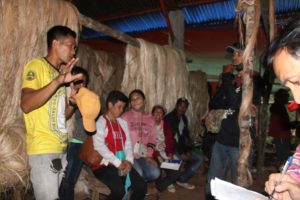“I read some provisions and discuss it with friends.”
Above is the self-description of 36.07% of peace advocates, humanitarian responders and community leaders working in the 5 provinces covered by the Bangsamoro Autonomous Region (BARMM) and other communities outside with Bangsamoro population who participated in the Bangsamoro Organic Law Awareness Survey (BOLAS) conducted by ECOWEB.
Only 2% said “I read and study the whole law.”
The rest of the 61 participants of the BOLAS, said “I read commentaries and listen discussions,” 22.95%, “I just read and hear it in the news” 19.67%, and 16.39% said “I am just aware that it existed.”
The BOLAS is conducted online by Ecosystems Work for Essential Benefits, Inc. (ECOWEB), a national NGO based in Iligan City who had been doing peace advocacy and humanitarian work in the BARMM and other communities populated with Bangsamoro and Indigenous Peoples (IP) in Mindanao over the last 12 years. ECOWEB conducted the random survey as part of its needs assessment for its advocacy and education effort in the BARRM communities under its Peace Action and Conflict Transformation (PACT) Program.
“Not so bad but really needs improvement. I am very concern of the 16.39%,” says Regina S. Antequisa, the executive director of ECOWEB. “If there is that considerable percentage among those who are working in the BARMM communities, what could be the percentage among the general populace? It might be higher. I think that’s the greater challenge.”
The BOLAS also revealed that 65.57% of the participants are aware that the system of government in BARMM is parliamentary while the rest said that it is Shariah (19.67%), federal (3%) and a combination of the above (11.48%).
While there is a high awareness about the system of government, the BOLAS also revealed that only 16.39% is aware that only members of parliament are going to be elected by the voters and 27.87% think that the voters could directly elect the Prime Minister. The rest thinks that all officials should be elected by the people.
“The high level of awareness that parliamentary is the system of government is encouraging, however, there is a need for further education as to how this would work especially on the matter of elections,” Ms. Antequisa added. “If this is not clear among us, peace advocates, there could be a greater need for awareness raising among the masses of voters.”
Asked about their best understanding of the BOL, an encouraging 55.74% said that “it is a Philippine law to govern the Bangsamoro.” The rest said that it is a law made by the MILF (13.11%), made by the former ARMM government (11.48%), a law specially made by the Duterte administration (9.84%) and part of the Muslim code of laws (9.84%).
The diversity of opinion shown above is further revealed when participants were asked who passed the BOL. The response is a bit concerning: 37.27% said it’s the Philippine Congress, 21.31% said it’s the peace panels of the Government and the MILF, the same percentage said it’s the former legislative assembly of ARMM, 6.56 said it’s the MILF. The most concerning is that there is still 11.48% who thinks that it was President Duterte who passed the law.
“The level of diversity of understanding is normal considering that the law is still new; it is even encouraging,” says Rockrock Antequisa, ECOWEB’s Program Development Advisor (PDA) who is overseeing the development of the PACT Program. “The result of the BOLAS, participated by the peace advocates and humanitarian responders, is not definitive but it clearly poses a real challenge as to how we could continue journeying with the Bangsamoro in the road to self-governance. This is still the first phase of the BOLAS. There is second phase where the survey is going to be conducted at the grassroots level.”
“The above result already gave us a hint of what to focus in terms of developing our information and education program among the front-liners,” Rockrock Antequisa added. “The front-liners need to have a clearer understanding of the context, development and the basic features of the law so that they could be more effective in encouraging more meaningful grassroots participation in governance. Perhaps the 2% who read and study the whole law could be increased.”
Asked who should lead in the information and education campaign on BOL, the survey participants top three suggestions are the national government, BARMM government and the civil society organizations. They also suggested the involvement of DepEd and the Philippine Information Agency (PIA) and the media in general.
As to who should be given focus in the campaign, the participants’ top three recommendations are the marginalized sectors, the youth and the indigenous peoples within BARMM. They also strongly suggested to focus the women sector and the members of the MILF and other former combatants.
ECOWEB plans to conduct the second phase of the BOLAS in the second week of October via online and direct interviews. The full report of the BOLAS is expected to be out by the end of October. ECOWEB hopes that the survey result could help local, national and international organizations strategize what and where to focus their efforts and resources in terms of raising more awareness for participatory and accountable governance in the BARMM.

